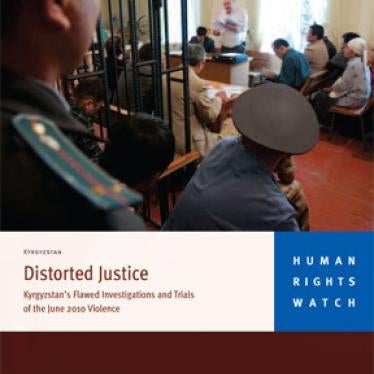(Bishkek) – Courtroom violence during a hearing in the case of an ethnic Uzbek on trial for alleged crimes during the June 2010 ethnic violence seriously undermines his right to fair trial. Such violence and hostility has occurred repeatedly during the trial, which began in September 2011, and at other trials of ethnic Uzbeks linked to the 2010 violence.
During a hearing on May 15, 2013, in the Osh Regional Court, several women in the courthouse attacked the defendant, Mahamad Bizurukov, which included throwing a bottle and a bag at him. The women screamed at the judges and beat security officers as they tried to get at the defendant.
“If Bizurukov, his lawyers, judges, and security officers have to fear for their safety every time they enter the courtroom, something is fundamentally wrong with the system,” said Mihra Rittmann, Central Asia researcher at Human Rights Watch. “This case has been plagued by violence from the start and it needs to stop. Kyrgyz authorities need to prevent these women from violently obstructing the judicial process.”
Bizurukov, 35, was arrested in June 2011 and charged with “unlawful deprivation of freedom” for his alleged connection to the death of Almaz Askarov, an ethnic Kyrgyz killed in June 2010. Since his trial began, his case has been through multiple stages of review, several of them marred by violent attacks in the courtroom. In February 2013, the Supreme Court returned his case to the regional court for retrial.
Observers at the May 15 hearing informed Human Rights Watch that approximately a dozen of Askarov’s relatives were at the hearing. As soon as security guards brought Bizurukov into the courtroom, several female relatives attacked him, trying to hit him with their fists. The women only returned to their seats after the guards locked Bizurukov into the defendant’s cage in the courtroom.
Soon after, three judges entered the courtroom, at which point the victim’s mother stood and began screaming at and berating them, calling the court biased. Even after a witness was brought into the courtroom, the woman continued to shout. The judges took no action to quiet her or remove her from the courtroom, according to observers. Instead, the judges adjourned the hearing until June 5, and left the room.
When the guards removed Bizurukov from the cage, several female relatives rushed at the guards, attempting to attack Bizurukov. The guards managed to drag Bizurukov out of the courtroom, largely protecting him, but the women persisted, attacking the policemen instead, and trying to get to the holding cells where Bizurukov was locked up. Observers who witnessed the attack said the women continued to attack the policemen, including by hitting them in the face. The women also ripped one of the guard’s shirts.
Under article 234 of Kyrgyzstan’s Criminal Code, assault is a criminal offense punishable by up to seven years in prison, especially when directed against a law enforcement official. Under article 317 of Kyrgyzstan’s Criminal Code, obstructing justice is a crime punishable by up to three years in prison. Disrespecting the court, a crime under article 321 of Kyrgyzstan’s Criminal Code, is punishable by a heavy fine and up to two years of correctional labor.
“The Kyrgyz authorities should immediately investigate this latest courtroom assault and hold the attackers accountable for their actions against Bizurukov, the security guards, and the judges,” Rittmann said. “Violence in the courtroom should be stopped, and the attackers shouldn’t keep getting away with it.”







